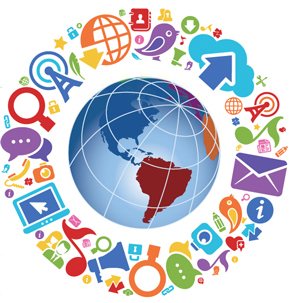Go Global

Best edtech practices from around the planet
Technology has enabled us to push back the classroom walls and stretch our virtual arms across the globe to shake hands with students almost anywhere. Social media sites like Facebook reduce the distance between countries as more people join these communities (there are now over 900 million members) and as more devices provide instant connections (more than 200 million people access Facebook via mobile devices). Our students are residents of these virtual worlds, and technology gives them access to a wide range of experiences, places, teachers, and students.
Some of the most successful global education projects I have seen simply require access to a shared space online. One of the best sources for collaborative global projects is Flatclassroom Projects. This site links classrooms across the planet and provides a defined set of goals and objectives that match well with many subject areas. These goals help teachers as they work with their students. The site also offers a certification course for flatclassroom teachers.
Considerations
Global project learning opportunities are diverse and provide huge opportunity to interact with students in different cultures as well as renowned experts and leading teachers. But, like everything, there are some considerations. Before you begin, consider the following:
Do your school or district’s network policies allow access to wikis, Skype, and social networks (e.g., Facebook or Ning)?
What are your school’s policies on providing online access for students, sharing images and data, and protecting their privacy?
Tools and ideas to transform education. Sign up below.
Do you have suitable and compatible software, hardware, and infrastructure to enable connection and sharing?
All of these projects should be deliberate and considered. They are hugely beneficial, but do require careful identification of goals, proper planning, establishing acceptable norms, and setting expectations of behavior and suitable reflection.
Read more of Andrew Churches’ work at Educational Origami.
TOOLS FOR GLOBAL LEARNING PROJECTS
Skype for Education:http://education.skype.com
Wikispaces: ad-free wikis for education http://www.wikispaces.com/content/teacher/
Wetpaint wikis: http://wikisineducation.wetpaint.com/
Ning: http://www.ning.com Social networking (this service has a cost)
Facebook Groups: This feature can potentially be useful, but check your school’s policies first.
